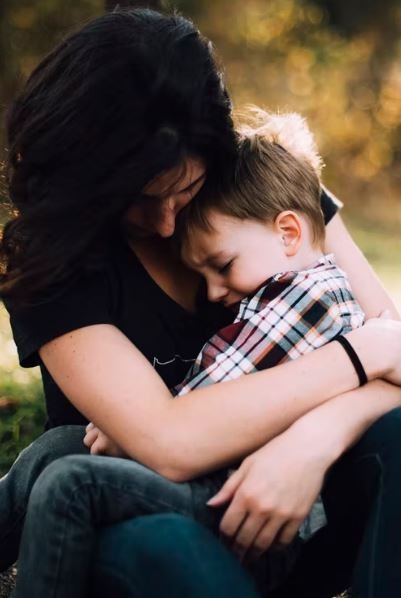Children experience a lifetime of loss when a family member, friend, or other important person passes away. That is why it is important to know how to help a child say goodbye to a grandparent. For some time after a death, it is normal for children to miss the deceased and to experience grief that may come and go with varying degrees of intensity. It can be difficult for parents and other caregivers to know what to do, how to react, and how to support children who are clearly in pain. Based on research and experience among volunteers and professionals in the field of children’s grief support, here are some recommendations for assisting a grieving child. It is significant to note that each child’s response to grief is distinct, varied, and wide-ranging.
Tell the Truth
Most parents and other adults who are responsible for children would probably agree that they would prefer for their kids not to have to deal with any potentially upsetting truths after a death. To order to protect children, we frequently avoid using words like dead or die or we downplay the details of how a person passed away. Unfortunately, we frequently end up with new issues as a result. Although sharing the truth about how someone passed away can be difficult, doing so helps to foster understanding, fosters trust, and makes it easier for kids to approach us with questions because they know they can rely on us, to be honest with them.
Know That Each Child’s Grief Is as Particular to Them as Their Relationship with the Deceased Was
Children will each experience and express grief differently as a result. Some kids need to talk about the person who passed away and how they are feeling about it, while others may not want to talk about the person at all. Still, other kids may choose to express their grief through writing, music, play, or art. These expressions show how children are adjusting to life without that person’s physical presence and memories, regardless of how they may experience and express their grief.
It’s crucial to not assume what children may be thinking or feeling in the wake of a death. Responses can range from sadness to rage to fear to guilt to even relief. It’s crucial to pay attention to children, interact with them on their terms, and learn about the various ways that children experience grief.
Know That Children Will Experience Grief Over the Passing of Important People at Various Points in Their Lives
Intense emotions of grief frequently last longer and occur more frequently than we anticipate. Children may notice the strong emotions lessen over time as they have more opportunities to express their grief, share their memories, and reflect on what this death means to them. However, dealing with grief is a lifelong process, and children frequently go through it at different stages and intensities throughout their lives.
Children Between the Ages of 0 and 2
Children under the age of two have no concept of death, but this does not mean that they are not affected by the loss of a loved one. Children of this age will notice the alteration in daily routine which is why understanding children’s development at an early stage is for the better.
When comforting an infant after a loss, physical reassurance and upholding a routine are crucial. establishing physical contact, cuddling, and only speaking in soothing tones. Maintaining the child’s routine as much as possible will help to maintain stability despite the increase in crying.
Children Between 2 to 6 Years of Age
At this age, people only have a very literal understanding of the world. Children may perceive death as a type of sleeping or a brief absence because it is unknown what causes it. Avoid using euphemisms and give succinct, direct responses to questions.
While preschoolers can comprehend more about death than babies, the uncertainty, fear, and anxiety they may experience after losing a loved one can result in recurrent inquiries about dying, what happens to the deceased, regression into behaviors like thumb sucking and bedwetting, intense, terrifying dreams, increased aggression, and outbursts of hitting or yelling.
At this age, you can start to comfort children by talking to them as well as by doing things for them. It’s important to be patient and to comprehend the confusion preschool-aged children are experiencing to comfort them.
Children Between 6 to 8 Years Old
Children of school age start to understand the biological significance and finality of death. Children of this age frequently start asking questions about what happens after a loved one passes away in addition to understanding the physical meaning of death.
Children’s emotions mature during this period of development, and their emotional spectrum significantly widens. As children experience guilt over the loss of a loved one, they frequently have many questions about life and death at this age. They may believe that their thoughts or conversations with the deceased caused their death. loneliness following a loved one’s passing and concern for the safety of parents or other important adults
Children are better able to express their emotions at this age following the loss of a loved one. Children and adults can start talking about and exploring their worries about dying, their sadness over it, their uncertainties about it, and what comforts them after losing a loved one.
Ages 8 to 12 Years Old
Helping children in grief requires an understanding of the new social pressures that preadolescents experience as well as the universal distress and emotional hardship of grief that we all experience. Understanding, anticipating, and accepting the mood swings that will come with this period of grief and mourning will help you to support them. offering an honest and open discussion about the deceased loved one’s life and death. allowing regressive behavior to happen because it is typical of the grieving process, and promoting play and using writing, art, music, or physical activity as an outlet
Ages 12 to 18 Years Old
Children who are now getting close to adulthood may start relying on their peers’ support and developing closer relationships with their friends at this point in their lives. As children turn more to others for solace and support, you can still be there for them by promoting verbalization of feelings, being there to offer advice when they require it and when they’re ready to speak, and giving them the freedom to choose how they experience and recover from their loss.


